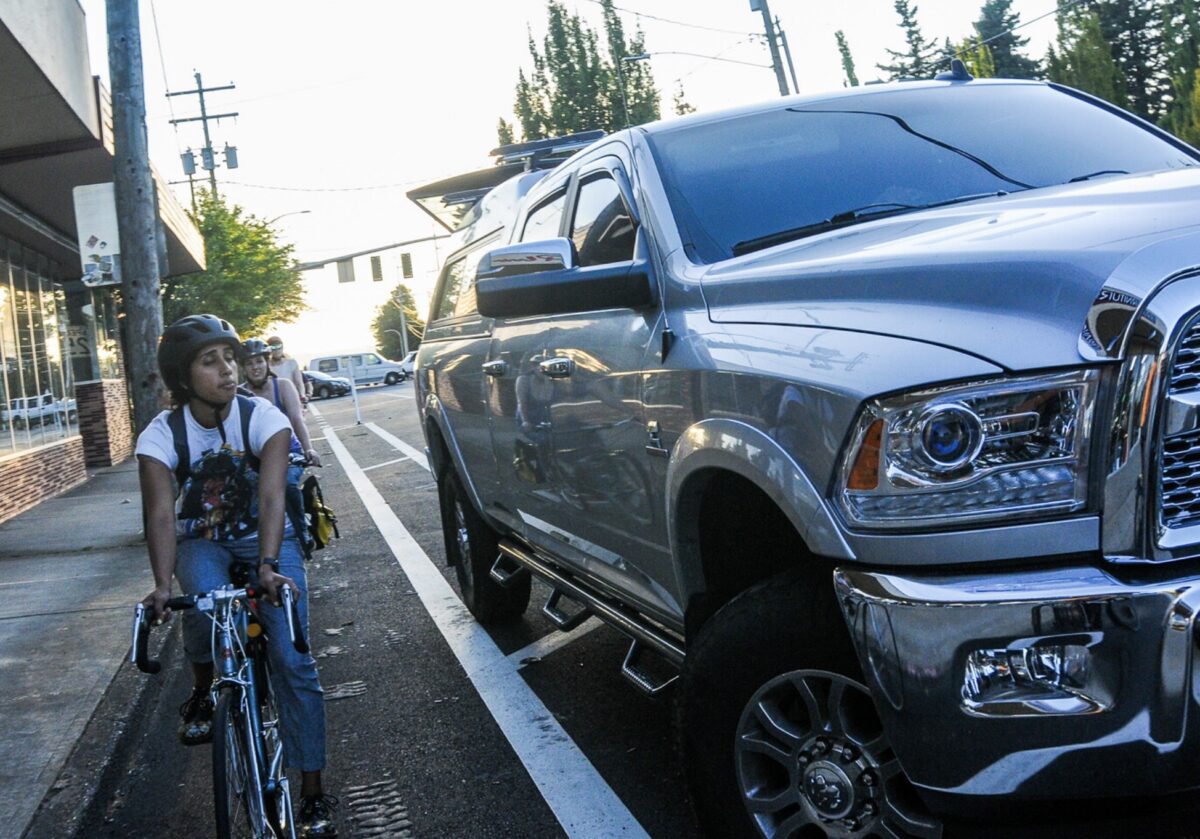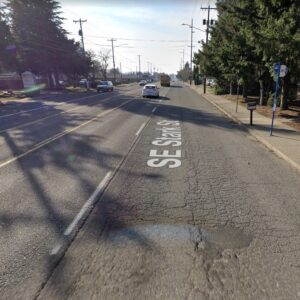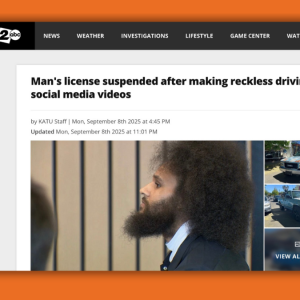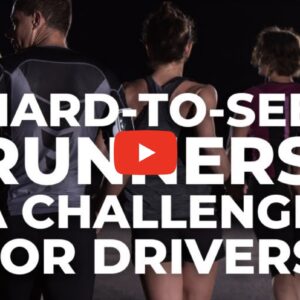Have you ever considered the idea that we are ordained with certain privileges when we drive cars and trucks that we simply don’t get when we choose to ride bikes?
This idea of “driving privilege” has bounced around my head for years and I often think about it as I ride around town. Any time we step into our cars (I own two of them and drive weekly), we benefit from driving privilege. It’s not something we have to opt into, it’s just always there. Because driving is heavily favored by the system of policies, projects, and people that influence how we get around.
The flipside of course, is that people who use the streets while not driving a car or truck, do not benefit from these privileges.
To help flesh this out, I’ve made a list.
Driving privilege is…
- when you can lose control of your car, let it smash into other people and property, and then have the media excuse it as nothing more than an “accident.”
- when you don’t have to worry that road debris will give you a flat tire and make you late for something important.
- when you can know that any road street or highway that you’re on will never, just, suddenly, end.
- when even minor road projects don’t create hair-raising work zones.
- when loved ones don’t fear for your life every time you leave the house.
- when you don’t have to spend hours of your time doing advocacy just to make road conditions a little better.
- when your main concern about our growing population is that you won’t have anywhere to park.
- when you’ll never be asked to get out of your car and walk around a busy area.
- when politicians, judges, bureaucrats and cops will always sympathize with you.
- when you can drive 11 miles over the speed limit and not get pulled over for speeding.
- when you know that if you make a tiny mistake, you probably won’t die or get badly hurt.
- when you don’t have to worry about strangers making lewd comments about your body when you drive.
- when you’ll never have to get out of your car to push a button so the signal will change.
- when every time you plan a route you don’t weigh the chances of dying versus directness.
- when you just expect that your route to work will be plowed when it snows.
- when you never have to worry about a random stranger throwing something at you just for fun.
I’m sure you can think of others.
To me, driving privilege is just another reason why I cringe when people act like our conversations about safe streets and policy issues are somehow a level playing field. They’re not. And we need policymakers to understand this and help us work toward a more fair and balanced system.








Thanks for reading.
BikePortland has served this community with independent community journalism since 2005. We rely on subscriptions from readers like you to survive. Your financial support is vital in keeping this valuable resource alive and well.
Please subscribe today to strengthen and expand our work.
Driving privilege is…
never having a potential employer concerned you’ll make it to work on time or die trying b’cuz you ride a bike.
to never know what it means to be a vulnerable road user.
to never have to wear high-viz clothing and be lit up like a rolling Christmas tree in hope of not being run over by a motorist.
having a city infrastructure designed specifically to accommodate your mode of transport.
having government agencies always working on your behalf.
just normal every day life all over the world.
Thanks for articulating this list. And I’m looking forward to seeing how others add to it. As a parent, I feel like another driving privilege is never having anyone, ever, question whether you are endangering your kids’ lives with the way you are transporting them. Whereas I’ve gotten a lot of shade from various folks about biking my kids around!
You don’t have to carry locks that weigh nearly much as your car, so you feel it’s safe to leave it parked.
It is no longer safe to leave your car parked in many areas, so we may be reaching a sad point of equity on this front. People aren’t going to cut your bike’s catalytic converter off or smash its window to get the quarter you left in the drink holder.
They will cut the lock and sell your bike for a hit of meth, but then they’ll do that with your car as well. Between jiggle keys and USB cables, it’s probably easier to steal some cars than a well locked bike.
Yeah but they will steal your seat bag and its contents while you’re in Safeway for 1 bag of groceries.
…when driving is assumed to be “the norm” and biking is for liberal root-eaters who wear Spandex and flout the laws because they’re “bikers.”
There is an expectation that a car will not be stolen while you are in a store or movie theater, or if you leave it locked in front of your house overnight. A locked bike left out is seen an invitation to have it stolen or stripped.
The one I have noticed recently is when I meet an oncoming car on a queuing street, cars assume that I will just dart out of their way. Even on greenways. It is particularly irksome when a driving lane is blocked by an illegally parked delivery vehicle, oncoming drivers will just swerve out around them into my lane despite me coming right at them and just expect/force me to swerve out of their way- driving privilege!
Another is not advocating for safe, clean beaches, sidewalks, parks, trails and openspaces because a car opens up the opportunity to simply bypass hazards and drive somehwre clean and safe, something that people who rely ioon walking, biking or transit do not hav ethe option to do
Not to mention the privilege of being able to park or idle your car in a way that obstructs vehicle travel lanes, parking spots, pedestrian crossings, curb cuts, and especially bike lanes with impunity.
Also the privilege to drive cars on designated transit lanes and to make turns in violation of posted ‘no turn’signs.
These are there regular practices of app based delivery and transportation vehicles that have increasingly overrun Portland and other cities in the last decade.
Oftentimes the vehicle that is swerving out into your lane and physically forcing you to yield is doing so to get around a vehicle that is parked in a way that inconveniences other road users with seemingly little concern for the impacts to others.
Don’t forget the driver’s license. As a person who has never learned to drive and who doesn’t have one, I’ll tell you it’s nearly impossible to get any city job anywhere in the USA, including at PBOT, and quite a lot of other professional white-collar jobs. And that most jobs of any sort are usually located in places without any public transit, sidewalks, and safe bike routes, in most of the USA – you pretty much cannot survive without a running car – and yet many of us somehow do survive.
Don’t forget all the covid test centers and vaccination clinics that were drive-in only.
David Hampsten
PBOT/Departments of Transportation don’t surprise me. PennDOT (PA) has many roads that effectively prohibit pedestrians with Jersey barriers or signs, so I would not be surprised if they allegedly need all employees to be able to drive to sites.
I’m curious about your experience with other white collar jobs, especially non-government. I’ve seen quite a few generic applications asking about driving record/license information, but after confirming that the job does not involve driving, I’ve left them blank without problems.
Is the problem background checks that they won’t perform with state non-driver ID’s? I’ve had a number of banks insist on actual in state driving licenses for accounts (I did not open an account).
…when you can engage in illegal, distracted (and dangerous) driving, knowing that it is highly unlikely you will be caught.
yyyyes! That’s a great one. Bicycle riders are much easier to see by police (when they used to actually watch for stuff, that is!), and can lead to more engagements. I have experienced this personally a few times. I’ve had officers try to talk to me about something they perceived as dangerous or against the law and the only reason they engaged with me was because I was on a bike.
Particularly if you are being black while bicycling – I’ve met many black riders here in NC who avoid biking in white areas because of police harassment or nosy neighbors calling the police.
When you can just punch in a destination on Google Maps and follow the directions without scrutinizing every single detail beforehand to make sure you’re not being directed into a death trap.
When you can get into your car and drive on roads with consistent signage, intuitive flows and convenient, safe vehicle storage at the end of your trip, no matter where you’re going.
When you can almost kill someone on a bicycle by closely speeding past them, and then un-ironically justify this anti-human behavior by yelling “share the road!”
Route finding is so easy as a driver. If the road goes there, you can pretty much use one of several free mapping services or follow a plain road map and get there.
Before I ride my bike someplace new that’s anywhere outside of the main grid of Portland, I spend so much time trying to figure out the best way to go or if it’s even feasible to ride a bike there. The best route by bike takes into account distance, topography, bike infrastructure, how fast cars go on that road, and so many things you just can’t see on a map.
Even riding my bike to a new part town, I’m always trying to figure out if Google Maps is sending me on some weird route or the actual best bike route. There’s so much additional time beyond travel time.
That’s the bullet point above that resonates the most with me. When deciding how to get somewhere in a car and using a map app, the red line indicates inconvenience. On a bike, the red line (e.g. Metro’s bike map) indicates the chance of dying. Privilege defined.
…being able to get to your destination without finding your only route blocked by tents, debris, and broken glass.
When you’re driving a car, use of a drive-up window at a bank or fast food restaurant is completely acceptable and expected. When you are riding a bike, service is at the whim of the establishment or the employee. I’ve been refused service due to “safety” reasons.
When you don’t have to worry about people assuming you’re not going anywhere important vs. just riding around on your toy for fun.
That one is at the heart of so many things I hate (you mentioned some)–construction detours that only accommodate driving, people parking in bike lanes or on sidewalks “so I don’t block traffic”, streets designed without thought to anyone not driving, drivers wanting bikes off the road or street because they’re interfering with people trying to get to work…
Totally! Huge electric reader boards are installed weeks before a bridge close for car lanes so peopel can plan and prepare. They close the bike lane on the Steel Bridge without a single warning sign or detour.
“when you never have to worry about a random stranger throwing something at you just for fun.” When it does (rarely) happen, as recently with the man throwing rocks at windshields, it’s in the news and the police are on it.
How often does that happen when people throw things at cyclists that could hurt/kill them but wouldn’t cause difficulties at all (not even scratched paint) for drivists.
This is great! Well said!
When your vehicle is large, bright, and tall enough to be easily seen by scofflaw drivers barely looking prior to blowing through stop signs and red lights at night.
The overwhelming sentiment of the piece and the comments is that cycling is miserable and dangerous.
The question is why anyone would do anything they thought was dangerous? Seriously. The reason I cycle is it’s the best way to get around, and driving in Portland sucks. I own a vehicle, but the last time I tried to start it, I had to jump start it due to dead battery — it hadn’t been driven in over a month .
As someone who rides all over Portland in anything, my consistent observation is that a quite a few people will ride short distances when the weather is great — a time when there is actually more rather than less traffic and the cycling infrastructure is less safe due to inconsiderate and inattentive riders.
However, as soon as distance, heat, cold, darkness, wet, wind (i.e. what most have to contend with the vast majority of the time) and that number dwindles to hardly anything. That these things dissuade people from riding shouldn’t be a surprise to those who think having to wait at a signal like drivers do or to cross a single bridge with a modest grade is a disincentive. This is not a jab at anyone — very few people and practically no animals choose uncomfortable/inconvenient conditions when they have an option.
One of the weirdest things about Portland is that it seems like a higher percentage of cycling advocates than drivers believe that bicycles don’t belong on the roads. I’d have thought a better way to get more people cycling is to show how well it works practically everywhere than convince them they need something other than what they have to work with.
Since privilege is the subject, a group that’s significantly more able bodied than the general population (i.e. people who cycle) should be aware of theirs. I wonder if some of those keen on punishing drivers would change their tune if a significant distance, age, and/or physical issues were added to their personal situation?
“One of the weirdest things about Portland is that it seems like a higher percentage of cycling advocates than drivers believe that bicycles don’t belong on the roads.”
That’s misleading. Some drivers do believe bicycles “don’t belong on the roads” as in “bicyclists shouldn’t have a right to ride on the roads”. If
cycling advocates are saying cyclists “don’t belong on the roads”, it’s generally because they believe people biking deserve better/safer/more convenient places to ride than what current roads provide. I don’t know any that would say they don’t have a right to ride on the roads currently.
“I’d have thought a better way to get more people cycling is to show how well it works practically everywhere than convince them they need something other than what they have to work with.”
Cycling works well for some or many cyclists in some or many areas, but saying it works well practically everywhere isn’t true for many people (and any cyclist who says that may be exhibiting some privilege themselves, perhaps due to being stronger/braver/more experienced than others, or living in an area with better infrastructure).
And even if it did, that’s not a reason to not lobby for improvements. And lobbying for improvements is not the same as trying to convince people they NEED something other than what they have in order to ride. It’s saying they DESERVE better–they DESERVE more of the privileges currently reserved mainly for drivers.
Bravery, or courage, is character, not privilege.
The reason I’m a cyclist is that I was thrown off the bus 43 years ago for bad behavior. We lived 7 miles from school (I didn’t live in a town but went to a consolidated school) and my parents weren’t about to reward me for bad behavior with a car ride.
As a kid, I rode solo on roads I’m sure > 90% of the adults here would be terrified of today despite them being much better now. No bike lanes, no shoulder, virtually all rural highway in Trump territory. Post elementary/high school I rode a fair amount. I had a > 40 mile RT commute for over 10 years (mostly Monmouth to Corvallis). I’ve ridden RT from Monmouth to Eugene and Portland for work many times.
My mom pushed me to become a good cyclist. I was doing self supported multistate and multiday trips at 16. She personally helped many distance cyclists over the years. She taught me how to do all kinds of useful things — I could wire house circuits and use power tools when I was 10, skills I still use.
But thanks to cycling “advocacy,” she has become anti-cyclist despite being one of the most active people I’ll ever know. She has always been about active everything and has had a discomfort threshold well above most people, but her body is not cooperating nowadays. If we’re talking about DESERVE, people like her deserve to be treated with respect and consideration after a lifetime of doing the right thing.
I understand the inference that my suggestion that most areas are rideable implies privilege. I can only reply it’s stupid easy here compared to everywhere else I’ve lived. Most people here have no clue how bad it truly is out there, and anyone who thinks it’s tough here needs to ride much more.
I’m not against lobbying for improvements — quite the opposite. But playing the victim card as a Portland cyclist is ridiculous. If we want respect on the roads, it starts with owning them the same way as drivers do. Respect starts with something you give to yourself, not something others give to you. So step 1 needs to be to lose the kicked puppy routine and get more serious discussions going on.
There’s no reason to think that weather is destiny when it comes to bicycle mode share. Helsinki, Copenhagen, and other cities with much less hospitable climates than Portland have much higher year round bicycle mode shares.
Yes, in Portland you see lots of people out biking around in nice weather and fewer in poor weather. This is because most of those people are out for recreation rides. They aren’t commuting or taking trips that replace trips that would otherwise occur in SOVs. Portland has a nearly negligible bike commute mode share. Used to be in the double digits, but it is almost nonexistent today.
It’s not non-existent. I work (year round) at Go By Bike and through the winter we have a sizeable number of commuters who park their bikes with us. Yes the numbers drop off from the dry months, and yes overall mode share is down from what it was 10 years ago, but Portland still has A LOT of year-round bike commuters.
The elephant in the room is that most people who ride bikes also drive cars. When the weather turns foul they put the bike away for the season and don’t even think about riding until that first 60 degree day in spring.
An ongoing problem with BikePortland’s editorializing is the nearly constant narrative that these are two separate user groups, one that never drives, and one that never bikes. It’s disingenuous and divisive and it doesn’t encourage us to respect other road users. It plays out like a crusade run by religious fanatics and I’m starting to question whether they really want things to get better, or are only interested in crowing about their struggle.
With all of the talk about privilege over the last few years, I have been thinking about this as well. I think there is a good deal of confusion about what “privilege” really means. I think too many people hear “privilege”, and think, “hey, I drive a beater, man. I never know if I’m going to even make it to my destination! Where’s my ‘driver privilege’? Or, “I can barely afford gas – I don’t see how that makes me ‘privileged’.” It is too often equated with monetary wealth. Or the classic “Hey, I sit in bumper-to-bumper traffic for hours every day – doesn’t feel like ‘privilege’ to me!”
The conclusion that I have come to is that the easiest way to spot privilege is to note what happens when designing or using a system results in a conflict. Tension between speed and safety? If speed wins, that’s driver privilege. Should we have bike lanes or no bike lanes? If bike lanes are not created, or terminate prematurely, that is an indication of driver privilege (arguably, having/needing bike lanes at all is an indication of driver privilege, although the sense of “privilege” is often flipped in that case). When there is an altercation between a driver and a pedestrian or bicyclist, who is assumed to be in the right? Did the pedestrian “dart” or a bicyclist “swerve”, or “come out of nowhere”? That is an indication of privilege. Do some drivers feel like they are justified in buzzing a bicyclist they feel is “in the way”? That is an indication of “driver privilege”. Are bicyclists cited for minor offenses, while drivers speed and otherwise operate dangerously with seeming impunity? The real nugget is to spot who must operate hyper-vigilantly with a system to avoid negative outcomes, and who doesn’t need to give a thought to how the system is designed or works because they so rarely have negative outcomes? Of course, “negative” is open to interpretation as well – there are those who think that if their car breaks down or they are stuck in traffic, that’s a “negative outcome”. What I mean by “negative” is being harassed/cited, threatened, injured, killed, or having property destroyed.
I agree these are good examples, but realistically roads should be plowed when it snows, like they are in every other place I have lived.
… You can buy a vehicle that can go well over 100 MPH despite that not being legal in any context as a citizen on a public road, yet now that bikes have electric motors, legislators are bending over backwards to make sure they re speed regulated to 20 MPH.
I eagerly await Jonathan’s companion article, “What cycling privilege is”
Let me start:
I think there is also sometimes confusion between “reward” and “privilege”, or perhaps “accommodation”, which merely offsets a lack of privilege. Traveling a harder road, or pursuing what you love–or believe is right–despite hardships can be rewarding, but does not demonstrate privilege. Now if someone is fortunate enough to live in a place where doing what they love or believe is right doesn’t result in a “harder road”, that might be considered “privilege”.
Comment of the week.
Shared to my FB page.
When you assume that others see you. Every intersection is a game of guess if they actually saw me when I ride. Sure they looked right at me but they’re still rolling forward and didn’t actually stop at that stop sign. Are they just impatiently waiting for me to go so they can turn right or did they forget I was there and might turn into me if I go? The slow rolling forward could mean either.
I rarely worry about that when I drive, certainly not at every intersection. Only when I see someone actively looking away or playing with their phone do I consider it.
When there’s a state agency to record and establish the ownership of your vehicle.
When if the vehicle is stolen there’s a network of state and municipal agencies that will be on the lookout for it.
I’ve noticed people will allow semi-trucks to take as long as they want to get up to the speed limit, but will honk if a bike isn’t going 6 over the speed limit as soon as the light changes from red to green regardless of if the bike can get up to speed.
Being able to see street sings and stop signs at night! On most of our greenways, street signs and stop signs rely on headlights to be legible, a bike light, especially one witha cutoff, is not going to cut it. This make navigation tricky, particularly on the greenway routes that weave around from block to block. I was riding home on the Going Greenway in the dark and it looks so different thatn in the light. I was trying to be inon hte lookout for 7th, beacuse I know it has stop sign that can be difficult to spot in daylight. I could not read a single cross street name, and I almost blew the stop sign! I think PBOT should paint the street names on the road on greenways, or improve intersection lighting and use highger contrast signs on greenways (black text on white signs)